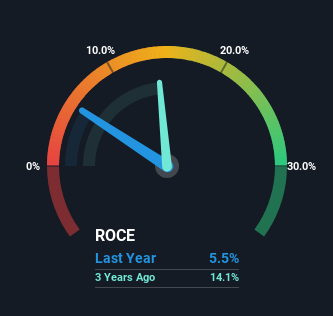- South Korea
- /
- Chemicals
- /
- KOSDAQ:A318410
Some Investors May Be Worried About BBC's (KOSDAQ:318410) Returns On Capital
To avoid investing in a business that's in decline, there's a few financial metrics that can provide early indications of aging. Businesses in decline often have two underlying trends, firstly, a declining return on capital employed (ROCE) and a declining base of capital employed. Ultimately this means that the company is earning less per dollar invested and on top of that, it's shrinking its base of capital employed. And from a first read, things don't look too good at BBC (KOSDAQ:318410), so let's see why.
Return On Capital Employed (ROCE): What Is It?
If you haven't worked with ROCE before, it measures the 'return' (pre-tax profit) a company generates from capital employed in its business. Analysts use this formula to calculate it for BBC:
Return on Capital Employed = Earnings Before Interest and Tax (EBIT) ÷ (Total Assets - Current Liabilities)
0.055 = ₩4.5b ÷ (₩88b - ₩6.8b) (Based on the trailing twelve months to December 2023).
So, BBC has an ROCE of 5.5%. On its own that's a low return on capital but it's in line with the industry's average returns of 5.9%.
Check out our latest analysis for BBC

While the past is not representative of the future, it can be helpful to know how a company has performed historically, which is why we have this chart above. If you're interested in investigating BBC's past further, check out this free graph covering BBC's past earnings, revenue and cash flow.
What Does the ROCE Trend For BBC Tell Us?
There is reason to be cautious about BBC, given the returns are trending downwards. To be more specific, the ROCE was 14% three years ago, but since then it has dropped noticeably. Meanwhile, capital employed in the business has stayed roughly the flat over the period. Since returns are falling and the business has the same amount of assets employed, this can suggest it's a mature business that hasn't had much growth in the last three years. If these trends continue, we wouldn't expect BBC to turn into a multi-bagger.
In Conclusion...
In the end, the trend of lower returns on the same amount of capital isn't typically an indication that we're looking at a growth stock. Investors haven't taken kindly to these developments, since the stock has declined 35% from where it was three years ago. That being the case, unless the underlying trends revert to a more positive trajectory, we'd consider looking elsewhere.
One final note, you should learn about the 4 warning signs we've spotted with BBC (including 1 which is significant) .
While BBC isn't earning the highest return, check out this free list of companies that are earning high returns on equity with solid balance sheets.
Valuation is complex, but we're here to simplify it.
Discover if BBC might be undervalued or overvalued with our detailed analysis, featuring fair value estimates, potential risks, dividends, insider trades, and its financial condition.
Access Free AnalysisHave feedback on this article? Concerned about the content? Get in touch with us directly. Alternatively, email editorial-team (at) simplywallst.com.
This article by Simply Wall St is general in nature. We provide commentary based on historical data and analyst forecasts only using an unbiased methodology and our articles are not intended to be financial advice. It does not constitute a recommendation to buy or sell any stock, and does not take account of your objectives, or your financial situation. We aim to bring you long-term focused analysis driven by fundamental data. Note that our analysis may not factor in the latest price-sensitive company announcements or qualitative material. Simply Wall St has no position in any stocks mentioned.
About KOSDAQ:A318410
Flawless balance sheet, good value and pays a dividend.
Market Insights
Community Narratives



